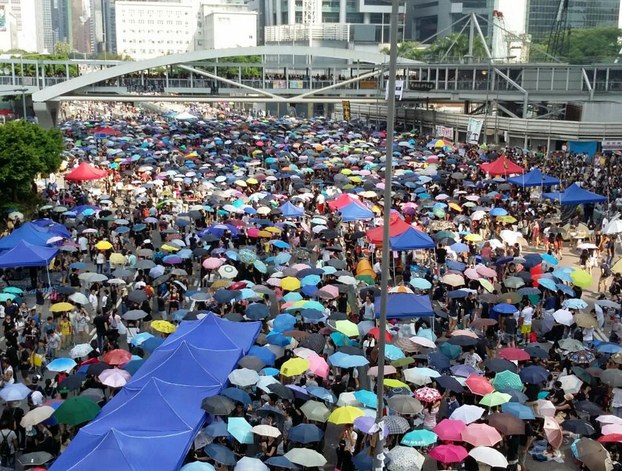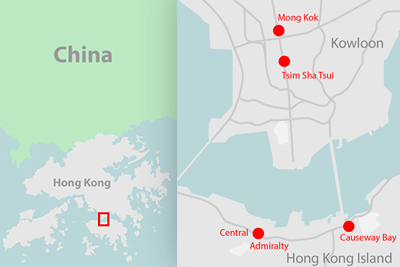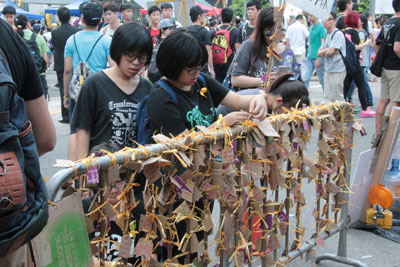




Updated at 9:15 p.m. ET on 2014-10-01
Student leaders behind the mass pro-democracy protests in Hong Kong warned Wednesday that demonstrators may move to occupy government offices if the Chinese territory’s chief executive refuses to resign, as Beijing told foreign countries not to intervene in its “internal affairs.”
The warnings came as protests championing democratic elections in Hong Kong entered their fifth day while the ruling Chinese Communist Party celebrated its 65th anniversary.
In defiance of warnings in the official Chinese media, crowds continued to gather throughout Wednesday in the Admiralty central business district and Causeway Bay shopping districts on Hong Kong Island and Nathan Road in Kowloon, stepping up calls for the resignation of Hong Kong chief executive C.Y. Leung.
As many businesses remained shuttered on the usually lucrative public holiday, student leaders warned they will escalate protests further if Leung doesn't step down by Thursday, moving in and occupying key government buildings.
"Leung Chun-ying must step down," Hong Kong Federation of Students second-in-command Lester Shum told reporters as the crowds began to swell during the National Day holiday, which saw a small, official flag-raising ceremony attended by Chinese and Hong Kong officials booed and heckled by the crowds.
"If he doesn't resign by tomorrow we will step up our actions, such as by occupying several important government buildings," Shum said, although he said any departments linked to essential public services would remain untouched.
Shum also called on Beijing to send an official to start a direct dialogue with protesters.
"We are asking them to come to the square and speak to the crowd," Shum told reporters. "This is a movement of Hong Kong citizens, and isn't led by any particular group."
But he said students would reject any dialogue with Leung.
The protesters want Leung to resign over the deployment of riot police, tear-gas, and pepper spray over the weekend, in a bid to make the huge crowds disperse from several key highways in the former British colony. 'Internal affairs'
'Internal affairs'
Chinese Foreign Minister Wang Yi, in Washington for talks with U.S. Secretary of State John Kerry, called on foreign countries to keep out of Hong Kong affairs.
"The Chinese government has very firmly and clearly stated its position. Hong Kong affairs are China's internal affairs," he said, Agence France-Presse reported.
"All countries should respect China's sovereignty and this is a basic principle of governing international relations," Wang said sternly ahead of his talks with Kerry at the U.S. State Department.
"I believe for any country, for any society, no one would allow those illegal acts that violate public order. That's the situation in the United States and that's the same situation in Hong Kong."
Kerry however renewed U.S. calls for restraint by the Hong Kong authorities in tackling the protests.
"As China knows, we support universal suffrage in Hong Kong, accordant with the Basic Law," Kerry told reporters, standing alongside Wang.
"We believe in an open society with the highest possible degree of autonomy and governed by rule of law is essential for Hong Kong's stability and prosperity," Kerry said.
President Barack Obama and his National Security Adviser Susan Rice later met Wang, expressing the hope that differences between Hong Kong authorities and protestors be "addressed peacefully," according to a White House statement.
Wang threw Beijing's support behind the Hong Kong authorities saying that they had the "capability to properly handle the current situation in accordance with the law."
Separately, senior U.S. lawmaker Ed Royce called for "genuine dialogue" to end the Hong Kong impasse.
“For nearly two decades, Hong Kong has thrived as a free society under ‘one country, two systems,’" Royce, the Republican chairman of the House of Representatives Foreign Affairs Committee, said in a statement.
"This freedom is now eroding as Beijing appears to undermine its promise to allow genuine democratic elections in Hong Kong," he said. "A managed choice is no choice at all."
Royce, who would lead a delegation to Hong Kong this year, called on all sides to exercise restraint, maintain the promise of the Basic Law, Hong Kong's mini constitution, and solve the issue through dialogue.
Teaching democracy
A Hong Kong protester surnamed Au who brought his four-year-old daughter to join protests occupying Kowloon's Tsimshatsui shopping district said Wednesday he wanted her to understand what the protests were about.
"I wanted her to see so many brothers and sisters here on the front line who are speaking out," he said. "She may be little, and she doesn't understand what's going on, but I wanted to play a support role and help out."
"It doesn't matter whether that's picking up trash or handing out ribbons—she may want to help the next generation when she grows up too," Au said.
A mainland Chinese tourist surnamed Shen said he wasn't inconvenienced by the demonstrations.
"Here, under one country, two systems, Hong Kong people will rule Hong Kong for 50 years," he said. "Hong Kong people have their own ideas; places are all different."
Meanwhile, a tourist from neighboring Guangdong province surnamed Liu said it was her first time in Hong Kong, which returned to Chinese rule in 1997 under the terms of a 1984 Sino-British treaty promising the city a "high degree of autonomy."
"It doesn't look good to the outside world," Liu said. "Perhaps they could make it quieter; will they resolve the issue this way?"
Meanwhile, Leung said in a speech at the flag-raising ceremony that Hong Kong had better stick to Beijing's plan for electoral reform, which rules out public nominations for the 2017 race for chief executive, saying candidates must be approved by a 1,200-seat pro-Beijing committee.
He ignored heckles from bystanders calling on him to resign, instead raising glasses of champagne with Chinese officials, including Beijing's representative in Hong Kong, Zhang Xiaoming.
"Hong Kong and the mainland are closely linked in their development. We must work hand in hand to make the Chinese dream come true," Leung said.
Riot police were withdrawn from the scene on Monday after widespread public anger brought thousands more protesters pouring onto the streets in solidarity with students and veteran pro-democracy campaigners.
Police were visible but remained well back from the occupying crowds on Wednesday, who have set up their own internal traffic systems and first-aid and supply posts.
Protesters are using a locally networked chat app to communicate across the massive crowds that have amassed in several key areas of the city.
Occupy co-founder Chan Kin-man on Wednesday made a tearful apology to residents for the disruption to their daily lives.
"With this short-term inconvenience, we hope to bring about a fairer system," he said.
But an editorial in the party's official People's Daily newspaper issued an ominous-sounding warning to protesters.
"If this extreme minority of people insists on violating the rule of law and stirring up trouble, they will wind up suffering the consequences of their actions," the paper said in an unsigned staff commentary, an indicator of official policy.
"'Occupy Central' will place obstacles in the path of the smooth development of a democratic system in Hong Kong," the paper said, warning of "unimaginable consequences" if the protests are allowed to continue.
It said public nominations had been ruled out in the interest of "safeguarding national sovereignty, security, development and to maintain the long-term prospering and stability of Hong Kong."
State broadcaster CCTV said all Hong Kong residents should support the "decisive" deployment of police to enforce the law and "restore social order."
And President Xi Jinping vowed in a National Day speech to "steadfastly safeguard" Hong Kong's prosperity and stability.
Show of support
In Taiwan, a democratic island that has been governed separately and has rejected Beijing's bid to reunify since the 1949 founding of the People's Republic, thousands of people gathered in downtown Taipei in a show of support for the Hong Kong pro-democracy movement.
"The people of Hong Kong have already stood up," student leader Lin Fei-fan, a key figure in the student occupation of the island's Legislative Yuan in March, told the crowd.
"We have seen in the past how people power can decide the future," Lin said. "We democratic neighbors must resist the Chinese Communist Party's penetrating influence on every front, whether it be their economic or their military power."
In London, colonial-era governor Chris Patten called for dialogue to resolve the stand-off between protesters and the authorities.
"I think we've got to see dialogue replacing tear gas and pepper spray," Patten told a BBC news program, radio's World At One program, adding that China was reneging on its promises of a high degree of autonomy for Hong Kong.
"In order to save face for Beijing, and for the Hong Kong government, the right thing to do is to embark on a new period of consultation, make it genuine consultation," said Patten, who was dubbed "guilty for 1,000 years," and "a whore" by pro-China media after he launched a last-ditch bid to boost the number of democratically-elected seats in Hong Kong's Legislative Council in the last years of British rule.
Celebrities from Hong Kong's normally neutral entertainment industry also spoke out in support of the Occupy movement on Wednesday.
International movie star Chow Yun-fat, who hails from the offshore island of Lamma, said Leung "cannot run away" from the demands that he accept responsibility.
"The students are very clever and rational," Chow told reporters.
"This is a peaceful protest. Why did [they] have to resort to the violent use of tear-gas?"
Meanwhile pop legend and movie star Andy Lau called on his official website for demonstrators to stay safe.
"Don't be provoked," he wrote in comments translated by the South China Morning Post newspaper. "No tear gas. No violence. No senseless arguments."
"Students and protesters, please be safe."
The comments came after a number of other local stars were spotted in the crowd, supporting the protests, the paper said.
Reported by Wen Yuqing, Ho Shan and Pan Jiaqing for RFA's Cantonese Service, and by Yang Fan for the Mandarin Service. Translated and written in English by Luisetta Mudie.